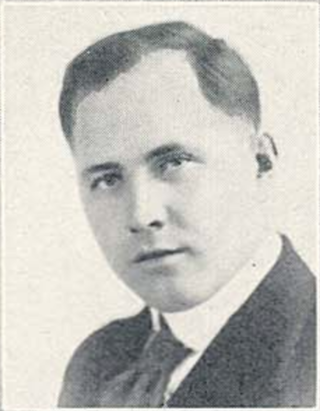Related Research Articles

Coles Bashford was an American lawyer and politician who became the fifth governor of Wisconsin, and one of the founders of the U.S. Republican Party. His one term as governor ended in a bribery scandal that ended in him fleeing Wisconsin, but he was later instrumental in the government of the newly formed Arizona Territory.

Frederick RobertZimmerman was a German American politician from Milwaukee, who served as the 25th Governor of Wisconsin. He served before and after his governorship as Wisconsin Secretary of State—for a total of eighteen years in that office. He also served one term in the Wisconsin State Assembly. His son, Robert C. Zimmerman, was also Wisconsin Secretary of State from 1957 until 1975.

John Charles Schafer was an American railroad operator and Republican politician from Milwaukee County, Wisconsin. He served six terms in the U.S. House of Representatives, representing Wisconsin's 4th congressional district from 1923 to 1933, and from 1939 to 1941. Initially a member of the progressive faction of Republicans, Schafer fell out with progressive leadership after the death of U.S. senator Robert M. La Follette Sr. and then became a supporter of the stalwart faction. Late in his career, he drifted into extreme anti-communism and was a defender of the Nazi German American Bund in the lead-up to World War II.

Clifford W. "Tiny" Krueger was an American politician, businessman, and circus performer from the U.S. state of Wisconsin. He served 34 years in the Wisconsin State Senate representing vast multi-county districts in the northern part of the state.

Gabriel Zophy was an American carpenter, building contractor, and Socialist from West Allis who served one term (1911–1914) as a member of the Wisconsin State Senate representing the Milwaukee County-based 7th Senate district ; cities of South Milwaukee, Wauwatosa, West Allis and Cudahy and the village of West Milwaukee).

Alex C. Ruffing was an American machinist and Socialist from Milwaukee who served four terms (1919–1926) as a member of the Wisconsin State Assembly and one shortened term in Wisconsin State Senate representing Milwaukee County-based districts
John R. Meyer was an American physicist from Milwaukee, Wisconsin who served one term in the Wisconsin State Assembly as a Republican state representative.
William R. Kasik was a Wisconsin businessman and insurance agent who served one term as a Republican member of the Wisconsin State Assembly from the 19th Milwaukee County district.

George L. Tews was a machinist, businessman and real estate broker from Milwaukee, Wisconsin, who served three non-continuous terms as a Socialist member of the Wisconsin State Assembly.
Marshall H. Reckard was a mechanic and politician from Milwaukee, Wisconsin, who served one term as a Socialist member of the Wisconsin State Assembly.
Edwin William Knappe was an American machinist from Milwaukee who became a lawyer, and who served one term as a Socialist member of the Wisconsin State Assembly.

Allen J. Busby was an American politician, educator, and lawyer from West Milwaukee, Wisconsin.
William A. Schmidt was an American welder and shop foreman who served two terms as a Democratic member of the Wisconsin State Senate from the Sixth District.
Peter P. Carr was an American grocer who served three terms as a Republican member of the Wisconsin State Senate from Rock County.

Walter Polakowski was an American upholsterer, trade union activist, and small business owner from Milwaukee, Wisconsin who served as a Socialist member of the Wisconsin State Assembly and Wisconsin State Senate for a total of 14 years. He was the older brother of John Polakowski, who succeeded him in the Assembly in 1922.
Ralph John Landowski was a plumber from Milwaukee, Wisconsin who spent four terms as a Democratic member of the Wisconsin State Assembly from Milwaukee.
Edward W. Reuther was an American politician who served one term as a Democratic member of the Wisconsin State Senate for the 6th District.

John T. Kostuck was an American salesman, piano tuner, and legislator.

Walton Bryan Stewart was an American teacher, machinist, labor activist, and Democratic politician. He served one term in the Wisconsin State Assembly, representing part of the north side of the city of Milwaukee.

William M. Rohan was an American farmer from Outagamie County, Wisconsin, who served a number of terms as a member of the Wisconsin State Assembly between 1911 and 1949.
References
- ↑ "Members of the Wisconsin Legislature 1848–1999 State of Wisconsin Legislative Bureau. Information Bulletin 99-1, September 1999. p. 25 Archived December 9, 2006, at the Wayback Machine
- ↑ Witte, Edwin E.; Kelly, Alice, eds. The Wisconsin blue book, 1933 Madison: Democrat Printing Company, State Printer, 1933; p. 553
- ↑ Ohm, Howard F.; Bryhan, Leone G., eds. The Wisconsin blue book, 1935 Madison: Democrat Printing Company, State Printer, 1935; p. 627
- ↑ "Would Contest Tie Vote Still: Luebke, Who Lost to Balzer for Assembly, Goes to Legislature Next." Milwaukee Journal January 27, 1939; p. 3, col. 1
- ↑ Toepel, M. G.; Kuehn, Hazel L., ed. The Wisconsin blue book, 1956 Madison: State of Wisconsin, 1956; pp. 57, 753
- ↑ Toepel, M. G.; Kuehn, Hazel L., ed. The Wisconsin blue book, 1958 Madison: State of Wisconsin, 1958; pp. 676, 778
- ↑ "Members of the Wisconsin Legislature 1848–1999 State of Wisconsin Legislative Bureau. Information Bulletin 99-1, September 1999. p. 78 Archived December 9, 2006, at the Wayback Machine
- ↑ "Genzmer Carries on, Gives Talk in Assembly on Lincoln" Daily Northwestern February 12, 1957; p. 10, col. 2
- ↑ "Ex-Assemblyman Dies" Janesville Daily Gazette February 1, 1962; p. 8, col. 8